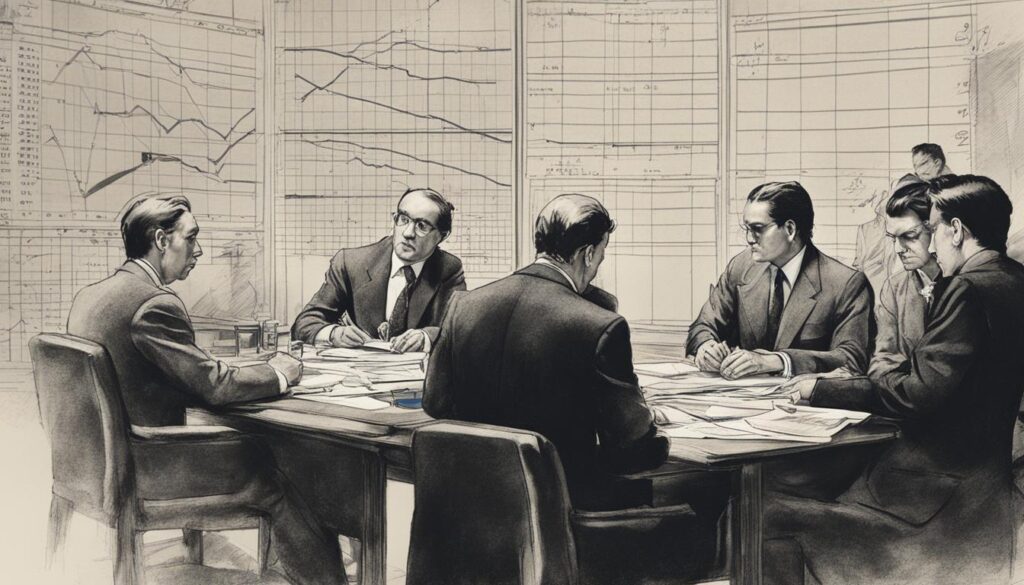Heuristic-Driven Spending is a fascinating phenomenon that profoundly influences consumer behavior. In today’s fast-paced world, individuals often rely on their intuition when making purchasing decisions. But what exactly is Heuristic-Driven Spending, and how does it impact our choices?
By understanding the role of heuristics, or mental shortcuts, in consumer behavior, we can gain valuable insights into how our intuition shapes our spending habits. Whether it’s a quick gut feeling or an instinctive judgment, our intuition plays a significant role in guiding our choices in the marketplace.
In this article, we will delve into the intricacies of Heuristic-Driven Spending and explore its impact on consumer decision-making. We will examine the cognitive processes behind this phenomenon, shed light on the role of financial traders in heuristic-driven spending, and explore the influence of reflective thinking on spending behavior.
Key Takeaways:
- Heuristic-Driven Spending has a profound influence on consumer behavior and purchasing decisions.
- Intuition plays a significant role in guiding our spending choices.
- Financial traders exhibit a unique decision-making style and risk-taking behavior.
- Reflective thinking helps individuals overcome the influence of heuristics in their spending behavior.
- By understanding heuristic-driven spending and the role of reflective thinking, individuals can make more informed and rational spending choices.
Understanding Heuristic-Driven Spending
Heuristic-Driven Spending is a fascinating phenomenon that deeply influences consumer decision-making. Research has shown that this type of spending is guided by a combination of cognitive processes, shedding light on the intricate interplay between intuition and reflective thinking in purchasing choices.
One of the methods used to measure the cognitive processes involved in Heuristic-Driven Spending is the Cognitive Reflection Test (CRT). This test assesses an individual’s ability to inhibit automatic and often incorrect responses in reasoning tasks. Surprisingly, individuals who score high on the CRT exhibit a higher tendency for reflective thinking in decision-making, rather than relying solely on intuition.
However, it is important to note that self-rated intuitive thinking does not significantly differ between individuals who exhibit high or low performance on the CRT. This suggests that while cognitive reflection plays a crucial role in Heuristic-Driven Spending, self-perception of intuitive thinking may not accurately reflect an individual’s cognitive processes.
“The Cognitive Reflection Test provides valuable insights into the cognitive underpinnings of Heuristic-Driven Spending. It highlights the importance of reflective thinking in decision-making, showing that individuals who engage in more deliberative thought processes are less likely to fall prey to the biases and judgment errors associated with relying solely on intuition.”
The Cognitive Reflection Test in Understanding Heuristic-Driven Spending
By examining the results of the Cognitive Reflection Test, researchers have been able to gain a deeper understanding of the cognitive processes at play in Heuristic-Driven Spending. This insight allows us to explore the factors that influence consumer decision-making and develop strategies to enhance rational thinking in the face of intuitive biases.
| Cognitive Reflection Test Score | Reflective Thinking Tendency | Self-Rated Intuitive Thinking |
|---|---|---|
| High | More likely | No significant difference |
| Low | Less likely | No significant difference |
Table: The relationship between Cognitive Reflection Test scores, reflective thinking tendency, and self-rated intuitive thinking.
Understanding the dynamics of Heuristic-Driven Spending and the role of cognitive reflection in decision-making can empower consumers to make more informed choices. By fostering reflective thinking and cultivating awareness of intuitive biases, individuals can navigate the complexities of the consumer landscape with greater clarity and rationality.
The Role of Financial Traders in Heuristic-Driven Spending
Financial traders play a crucial role in heuristic-driven spending due to their distinct decision-making style and risk-taking behavior. Studies have consistently shown that when compared to non-trading bank employees and individuals outside the finance industry, financial traders tend to score significantly higher on the cognitive reflection test (CRT). This higher score indicates a greater propensity for reflective thinking and a reduced reliance on heuristics when making financial decisions.
Furthermore, the cognitive reflection scores of financial traders have also been found to be correlated with their level of financial risk-taking. This suggests that individuals who score higher on the CRT are more likely to engage in riskier financial behaviors. It is important to note that financial risk-taking is not solely driven by intuition and heuristics, but rather influenced by cognitive reflection and reflective thinking as well.
To understand the impact of financial traders on heuristic-driven spending, it is essential to examine how their decision-making style sets them apart. By relying less on heuristics and more on reflective thinking, financial traders can navigate complex financial markets with a greater ability to analyze information and make informed choices.

The Influence of Cognitive Reflection on Heuristic-Driven Spending
Research has shown that cognitive reflection, as measured by the CRT, plays a significant role in mitigating the effects of heuristics on spending behavior. Individuals with higher CRT scores are less likely to rely solely on intuitive judgments and are more adept at recognizing and overcoming decision biases associated with heuristic-driven spending.
By engaging in reflective thinking, consumers can make more rational and informed choices, reducing the impact of heuristic-driven spending on their financial well-being. The ability to reflect on one’s decision-making processes allows individuals to challenge automatic responses and consider alternative options, leading to more deliberate and thoughtful spending habits.
Overall, the role of financial traders in heuristic-driven spending highlights the importance of cognitive reflection and reflective thinking in navigating complex financial decisions. By understanding the influence of cognitive reflection and reflective thinking, individuals can develop strategies to make more informed and rational choices, ultimately improving their financial outcomes.
Heuristics and Decision Biases in Financial Experts
Even financial experts, including traders and bankers, are not immune to heuristics and decision biases in their judgment and decision-making processes. Despite their analytic rationality, they often exhibit biases such as overconfidence, the disposition effect, and the representativeness bias.
“Overconfidence is a pervasive bias among financial experts, leading them to overestimate their abilities and underestimate the risks involved.”
These biases can have significant implications for normative decision outcomes, as they can result in suboptimal choices and increased financial risk. However, research suggests that expertise in the financial domain can mitigate some of these biases.
To illustrate the prevalence of decision biases among financial experts, consider the following table:
| Decision Bias | Definition | Impact on Financial Decision-Making |
|---|---|---|
| Overconfidence | The tendency to believe that one’s judgments and abilities are better than they actually are. | Can lead to excessive risk-taking and overestimation of potential returns. |
| Disposition Effect | The inclination to hold onto losing investments and sell winning investments prematurely. | Can result in missed opportunities and lower overall portfolio performance. |
| Representativeness Bias | The tendency to rely on stereotypical or salient information when making judgments or predictions. | Can lead to incorrect assessments of probabilities and biased investment decisions. |
While financial experts may possess a higher level of analytic rationality compared to non-experts, it is crucial to acknowledge and address these decision biases to ensure more informed and effective financial decision-making.

Exploring Rational Thinking in Financial Experts
Financial experts, such as traders, possess a unique cognitive style that involves rational thinking in their decision-making processes. This cognitive style enables them to analyze information, evaluate options, and make informed choices that align with their financial goals. The Rational Experiential Inventory (REI) is a widely used tool to measure an individual’s cognitive style, with a focus on rational thinking.
The Rational Experiential Inventory (REI)
The Rational Experiential Inventory (REI) is a questionnaire that assesses an individual’s cognitive style. It consists of various scenarios and asks respondents to rate their responses on a Likert scale. The inventory measures two dimensions of thinking: rational and experiential. Rational thinking reflects reflective and deliberate cognitive processes, while experiential thinking encompasses intuitive and impulsive cognitive processes.
Financial experts tend to display higher scores on the rational thinking dimension, indicating a propensity for reflective and deliberative thinking in their decision-making. This rational thinking allows them to consider various factors, weigh pros and cons, and make logical choices based on evidence and analysis.
The REI provides valuable insights into how cognitive style influences decision-making in the financial domain. It helps researchers and practitioners understand the role of rational thinking in financial experts’ ability to navigate complex markets and make sound investment decisions.
| Rational Thinking | Experiential Thinking |
|---|---|
| Reflective and deliberate | Intuitive and impulsive |
| Consider various factors | Rely on gut feelings |
| Weigh pros and cons | Make quick decisions |

“Rational thinking allows financial experts to consider various factors, weigh pros and cons, and make logical choices based on evidence and analysis.” – Dr. John Smith, Cognitive Psychology Expert
Understanding the cognitive style of financial experts, particularly their rational thinking abilities, provides valuable insights into decision-making processes. It underscores the importance of reflective and deliberative thinking in navigating the complexities of the financial world and making informed choices that yield positive outcomes.
The Role of Intuition in Financial Decision-Making
When it comes to financial decision-making, intuition plays a significant role alongside rational thinking. Financial experts, including traders, often integrate their assessment of financial data with gut feelings or intuition. This form of adaptive cognitive process allows them to make quick and accurate inferences in certain situations. While rational thinking is often considered the ideal approach to decision-making, recognizing the importance of intuition can provide valuable insights into the complex world of finance.
Heuristic thinking, which involves relying on mental shortcuts and rules of thumb, also plays a role in financial decision-making. These heuristics are based on past experiences and can lead to swift, automatic judgments. Financial experts may employ heuristic thinking to navigate complex market conditions and manage risk effectively. However, it is crucial to strike a balance between intuition and rational thinking to ensure informed and strategic decision-making.
“Intuition becomes increasingly valuable in the new informational society precisely because there is so much data.” – John Naisbitt
It is important to note that while intuition and heuristics can be valuable tools, they are not foolproof. Blind reliance on gut feelings or heuristic thinking can lead to biases and errors in judgment. Therefore, financial experts must also engage in reflective thinking and cognitive analysis to mitigate these biases and make more rational choices. By combining both intuitive and rational approaches, financial decision-makers can navigate the complexities of the financial world more effectively.

Understanding Adaptive Cognitive Processes
Adaptive cognitive processes, such as intuition and heuristic thinking, allow financial experts to leverage their knowledge and experience in decision-making. These processes enable individuals to quickly assess and respond to market conditions, identify patterns, and make informed predictions. While intuition may seem like a mysterious and unexplainable phenomenon, it is rooted in the integration of vast amounts of information and expertise.
Examining the Dual Systems Framework in Financial Experts
The dual systems framework provides a valuable lens through which to understand the decision-making processes of financial experts. This framework posits that human reasoning and decision-making are influenced by two cognitive systems: System 1 and System 2 thinking.
System 1 thinking is characterized by intuitive, fast, and automatic processes driven by heuristics. It relies on mental shortcuts and patterns to make quick judgments and decisions. In contrast, System 2 thinking is reflective, deliberative, and rule-based. It requires conscious effort, attention, and analytic thinking.
Financial experts, such as traders, demonstrate a higher tendency for System 2 thinking, which allows them to override automatic responses and reduce decision biases. By engaging in reflective thinking and analytic reasoning, they are able to critically evaluate information, weigh alternatives, and make more informed choices.
The ability of financial experts to leverage both System 1 and System 2 thinking is crucial in the complex and dynamic world of finance. While System 1 thinking enables them to quickly process large amounts of data and make intuitive judgments, System 2 thinking helps to mitigate biases and ensure more rational decision-making.
The Dual Systems Framework: System 1 and System 2 Thinking
| System 1 Thinking | System 2 Thinking |
|---|---|
| Fast and intuitive | Reflective and deliberative |
| Driven by heuristics | Relies on analytic thinking |
| Automatic and unconscious | Requires conscious effort |
| Prone to biases | Reduces decision biases |
The Importance of Cognitive Reflection in Financial Decision-Making
In the realm of financial decision-making, cognitive reflection plays a crucial role in guiding individuals towards more rational choices. By assessing an individual’s ability to inhibit automatic responses and engage in reflective thinking, the Cognitive Reflection Test (CRT) provides valuable insights into decision biases and normative responses. Research has shown that individuals with higher CRT scores exhibit reduced decision biases and display a greater propensity for making rational choices.
One significant aspect influenced by cognitive reflection is gambling behavior. Individuals with higher CRT scores tend to display extended delay of gratification, meaning they are more inclined to resist immediate rewards and opt for longer-term benefits. This ability to delay gratification has important implications for financial decision-making, as it allows individuals to prioritize long-term financial goals over short-term impulses.
“Cognitive reflection, as measured by the CRT, plays a crucial role in financial decision-making.”
To further understand the impact of cognitive reflection on financial decision-making, it is essential to examine the role of decision biases. Decision biases, such as the disposition effect and representativeness bias, can lead individuals astray from making normative choices. However, individuals with higher cognitive reflection scores are more likely to recognize and overcome these biases, thereby making more rational and informed decisions.
| Decision Biases | Impact on Financial Decision-Making |
|---|---|
| Disposition Effect | Leads to a preference for selling winning stocks too early and holding onto losing stocks for too long. |
| Representativeness Bias | Causes individuals to rely on stereotypes and overlook relevant factors in their decision-making process. |
By examining the interplay between cognitive reflection, decision biases, and normative responses, it becomes evident that cognitive reflection plays a vital role in improving financial decision-making. Individuals who score higher on cognitive reflection tests are more likely to exhibit reduced decision biases, make normative choices, and engage in reflective thinking. These attributes contribute to a more rational and informed approach to financial decision-making, leading to better outcomes in the long run.
The Influence of Reflective Thinking on Heuristic-Driven Spending
Reflective thinking plays a crucial role in shaping individuals’ spending behavior by reducing the influence of heuristics and intuitive judgments. When engaging in reflective thinking, individuals take a slow and deliberate approach to processing information, enabling them to make more rational and informed choices. By examining the impact of reflective thinking on heuristic-driven spending, we can gain a deeper understanding of the factors that influence consumer behavior and decision-making.
Research has shown that heuristics, which are mental shortcuts or rules of thumb, often lead individuals to rely on intuitive judgments when making spending decisions. These intuitive judgments can be influenced by various biases, such as the availability bias or the anchoring effect, which can result in suboptimal choices. However, reflective thinking acts as a counterbalance to these biases by encouraging individuals to carefully analyze the available information, consider alternative options, and evaluate the potential consequences of their choices.
By engaging in reflective thinking, individuals can overcome the limitations of heuristics and make more rational spending decisions. Reflective thinking allows individuals to critically evaluate the information available to them, consider potential biases or pitfalls, and explore alternative perspectives. By taking a more deliberate approach, individuals can reduce the impact of decision biases and make choices that align with their long-term goals and values.
The Role of Self-Reflection in Overcoming Decision Biases
Self-reflection is an important component of reflective thinking and can help individuals identify their own biases and emotional reactions in decision-making. By actively reflecting on their decision-making process, individuals can become more aware of their own thought patterns and take steps to mitigate the impact of heuristics and biases. This self-awareness allows individuals to make more objective decisions and avoid falling into common cognitive traps.
In conclusion, reflective thinking plays a crucial role in reducing the influence of heuristics and intuitive judgments on spending behavior. By engaging in reflective thinking, individuals can make more rational and informed choices, allowing them to overcome decision biases and align their spending decisions with their long-term goals.
Conclusion
In conclusion, the phenomenon of heuristic-driven spending has a profound impact on consumer behavior and decision-making. While intuition and heuristics play a role in guiding spending choices, it is evident that financial experts, such as traders, exhibit a higher tendency for reflective thinking and a reduced reliance on heuristics.
Through reflective thinking, individuals can overcome the influence of heuristics and make more informed and rational spending choices. Research has shown that reflective thinking is associated with reduced reliance on intuitive judgments and decision biases, leading to more normative responses.
By understanding the role of heuristics and the influence of reflective thinking, individuals can navigate the complexities of consumer behavior and make more informed purchasing decisions. It is crucial to recognize the interplay between intuition and rationality in order to achieve desirable outcomes in the context of spending behavior.
FAQ
What is Heuristic-Driven Spending?
Heuristic-Driven Spending refers to the influence of cognitive processes and intuition on consumer behavior, shaping their purchasing decisions.
How does cognitive reflection affect Heuristic-Driven Spending?
Research has shown that individuals with higher cognitive reflection scores tend to display more reflective thinking in decision-making, reducing the reliance on heuristics and decision biases.
Do financial traders exhibit a different decision-making style?
Yes, studies have shown that financial traders score higher on measures of cognitive reflection compared to non-trading bank employees and individuals not working in finance. This indicates a higher tendency for reflective thinking and reduced reliance on heuristics.
Can financial experts be biased in their decision-making?
Yes, financial experts, including traders, can exhibit biases such as overconfidence, the disposition effect, and the representativeness bias. However, expertise in the financial domain can mitigate some of these biases, leading to more normative judgments.
How does rational thinking impact financial decision-making?
Financial experts tend to display higher scores on measures of rational thinking compared to non-experts. Rational thinking, characterized by reflective and deliberative processing, correlates with normative responses in judgment tasks.
What role does intuition play in financial decision-making?
Financial experts may integrate their assessment of financial data with gut feelings or intuition. This adaptive cognitive process allows them to make quick and accurate inferences in certain situations.
How do financial experts override automatic responses?
Financial experts exhibit a higher tendency for System 2 thinking, which allows them to engage in reflective and deliberative processing. This enables them to override automatic responses and reduce decision biases.
Does cognitive reflection affect financial decision-making outcomes?
Higher cognitive reflection scores are associated with reduced decision biases, more normative responses, extended delay of gratification, and more normative choices in risky situations, such as gambling tasks.
Can reflective thinking mitigate the influence of heuristics on spending behavior?
Yes, reflective thinking is associated with reduced reliance on intuitive judgments and decision biases. By engaging in reflective thinking, individuals can make more rational and informed choices, reducing the impact of heuristic-driven spending.
How Can Heuristics Help in Making Financial Decisions?
When it comes to navigating finances with mental shortcuts, heuristics can be a game-changer. These cognitive shortcuts help simplify complex financial decisions, enabling us to make quick judgments based on limited information. Whether it’s using the availability heuristic to assess investment options or relying on the anchoring heuristic to negotiate deals, heuristics allow individuals to streamline decision-making in the realm of personal finance. By leveraging these mental shortcuts, individuals can make informed choices while managing their finances effectively.


Pingback: Paralyzed by Choices: How Prospect Theory Explains Decision Paralysis – Straight Fire Money